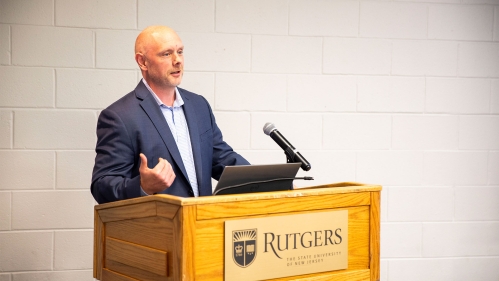School of Business Takes on Inequities at Environmental Justice Conference

Across the United States, minority and low-income communities face higher rates of cancer, asthma, and other severe or chronic health conditions. Practices like redlining and urban renewal have caused generations to endure toxic living conditions with little recourse for change.
However, the tide has started to turn in recent years, with more corporations held accountable for polluting communities. As concepts of environmental justice evolve, Rutgers School of Business–Camden was proud to host "Environmental Justice: Perspectives and Solutions to Build a Sustainable Future Together" with the Northern & Central New Jersey Chapter of the Air & Waste Management Association.
“One of our strategic goals is to be a business school with genuine societal impact, and this event gave us an opportunity to bring the community together to have a meaningful discourse on environmental justice,” said Monica Adya, dean of Rutgers School of Business–Camden. “Providing opportunities to bring different constituencies together on critical issues is our responsibility as an academic institution."
The September 27 event brought together more than 100 thought leaders, developers, government representatives, and community members to discuss a path forward from the long history of pollution and environmental degradation that has plagued many of America's low-income communities.
“The fact that we are here today is a tribute to how far we’ve come on this issue,” said keynote speaker Sean Moriarty, Deputy Commissioner with the New Jersey Department of Environmental Protection (NJDEP) and an alumnus of Rutgers Law School. “Despite the work that’s been done to ensure that people who live near and around regulated facilities are protected, disproportionate environmental impacts still remain, and we must do better.”
Moriarty discussed New Jersey's Environmental Justice Law, passed by the legislature and signed by Governor Phil Murphy in 2020. The statute mandates that the NJDEP reject certain permits for developing industrial facilities if they will have a disproportionate impact on overburdened populations. This past spring, the NJDEP released a comprehensive set of rules requiring input from vulnerable communities on the granting or renewal of any permit.
“Public feedback and engagement are not boxes to check or hurdles to clear on the way to getting a permit,” said Moriarty. He emphasized that including members of potentially affected regions is essential to building trust and creating equity for residents.
“I am so grateful to everyone who is in the room today, but I’m especially grateful for those community members who are sharing their perspectives with us,” Adya said. “We’ve heard a lot of positive feedback on how far we’ve come, but more important, we have heard where there is opportunity for growth and change, and that kind of dialogue is the reason these events are so essential.”